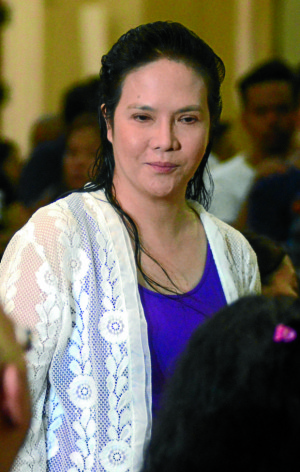Plea bargain for 80,000 small drug users sought
Saying it would save taxpayers P1.4 billion annually, Public Attorney’s Office chief Persida Rueda Acosta urged the Supreme Court on Monday to rule on a petition to allow around 80,000 “small-time” drug suspects to enter into a plea bargain with the government.
Acosta said allowing these suspects to plead guilty to a lesser offense, for example, would help ease overcrowding in the country’s jails.
“There are more or less 80,000 inmates nationwide who are willing to make a guilty plea. They were caught with 0.01 or 0.02 grams of illegal drugs but some have been jailed for 10 or 20 years because their cases have dragged,” Acosta told reporters after the first meeting of the Inter-Agency Committee on Anti-Illegal Drugs in Quezon City.
P1.4B in savings a year
“We will save around P1.4 billion a year if we allow small-time drug addicts to make plea bargains because that’s 80,000 inmates times P50 a day (for their food) times 365 days a year. That’s where the taxpayers’ money are used up,” she added.
Acosta said the group filed the petition asking the Supreme Court last year to nullify Section 23 of the Comprehensive Dangerous Drugs Act prohibiting plea bargains for drug suspects.
Article continues after this advertisementThat particular section states that any person charged under the Dangerous Drugs Act, “regardless of the imposable penalty, shall not be allowed to avail (themselves) of the provision on plea bargaining.”
Article continues after this advertisementAcosta said the high court had yet to release its decision.
“We are asking the Supreme Court to rule on this. Kidnapping or murder suspects are allowed to make plea bargains, but why are small-time drug suspects not allowed to do the same?” Acosta said.
“We can put in rehabilitation centers those who are still hooked on drugs so that we can clean up our jails. Our police clean up the streets but what if our jails remain infested with drugs?” she said.
Burden of policemen
“We are asking the Supreme Court for that provision of the law to be nullified because it encroaches on the rule-making power of the Supreme Court,” she added.
Director Fernando Mendez of the Philippine National Police said allowing plea bargains would help ease the burden of policemen.
“We have a lot of policemen who are witnesses in these cases and those who are still affected can be released and sent to rehab,” Mendez told the meeting.
“As long as there is no legal impediment, I think the PNP will not object,” he added.
